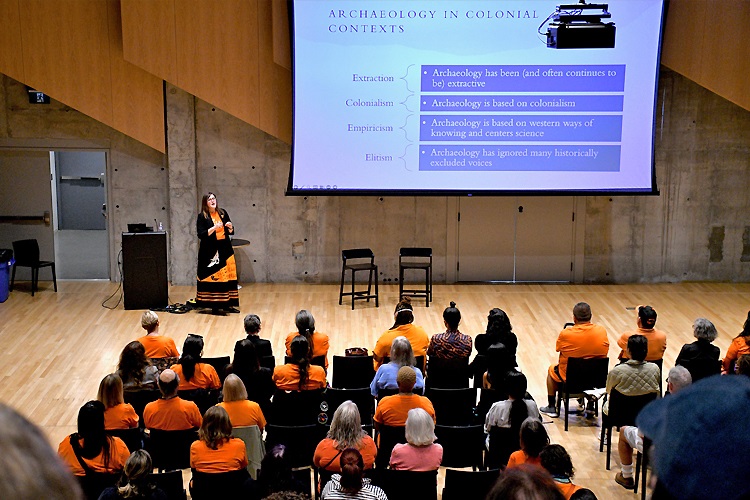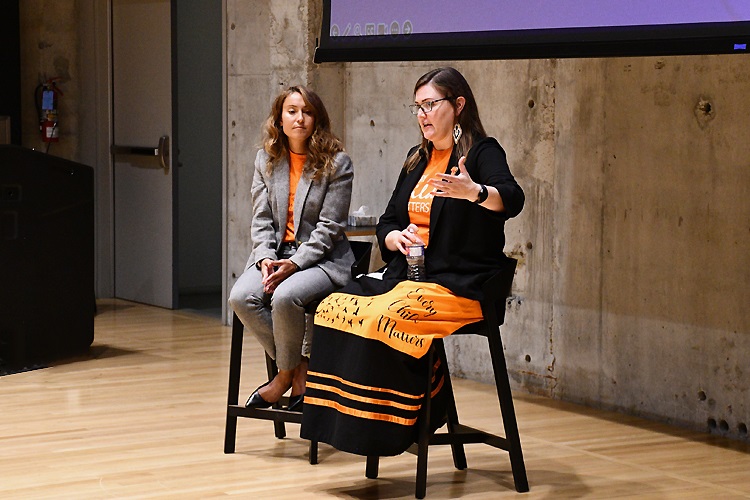On Friday, September 29, to commemorate Orange Shirt Day and Canada’s National Day for Truth and Reconciliation, the Faculty of Arts & Science partnered with the Department of Anthropology, the Centre for Indigenous Studies (CIS) and New College to present "Truth First: Indigenous Archaeology as Restorative Justice," a special talk by guest speaker, Professor Kisha Supernant (Métis/Papaschase/British), director of the Institute of Prairie and Indigenous Archaeology and professor in the Department of Anthropology at the University of Alberta.
An award-winning teacher, researcher, and writer, Supernant spoke to a packed auditorium of engaged students, faculty and staff about her work using ground-penetrating radar (GPR) to identify the sites of potential unmarked graves at former residential schools and her work with Indigenous communities to preserve these sites. Supernant also spoke about her heart-centred approach to archaeology, a practice that includes awareness of both the head and the heart when excavating the past.

The event began with a ceremonial smudging of the space, followed by a Cree prayer delivered by Brenda Wastasecoot, assistant professor with CIS.
After the opening ceremony, Supernant shared her background and the fundamentals of heart-centred archaeology, the belief that archaeologists do better work when they are in tune with and guided by their hearts as well as their heads. Heart-centred archaeology is categorized by four chambers of practice: care, emotion, relation, and rigor. Supernant expands on this concept in the book Archaeologies of the Heart, which she co-edited with fellow scholars Jane Eva Baxter, Natasha Lyons, and Sonya Atalay.
Supernant also spoke about her work as restorative, acknowledging that archaeology, historically, has been based around Western science, which is rooted in colonialism. By taking a restorative approach to this work, Supernant believes there is great power in archaeology to reckon with history, uncover hidden stories, and help build a way forward.

“When I think about archaeology, I very much orient my own work in the realm of restorative justice,” said Supernant. “For me, this means archaeology itself has value, and I think there's something really powerful about holding the belongings of my ancestors. So, it really is using the techniques of archaeology, the power that it does bring, to serve the needs and interests of community, whatever that might look like.”
Supernant then discussed ground-penetrating radar (GPR), the tool she’s been using to help Indigenous communities search for answers. GPR sends electromagnetic waves into the ground that bounce back and reflect differently depending on what’s below; this can provide information about whether there may be a grave below the surface.
A meaningful and powerful event, the talk concluded with a lengthy Q&A with audience members and was followed by a light reception, where the conversation continued.

Supernant is a U of T alum and earned her master's of anthropology degree in 2004. She reinforced that a significant part of her work as an archaeologist is to continue to evolve and improve archaeological practices and help Indigenous communities find these graves so they can hold ceremonies and seek justice, and she’s hopeful that archaeology can be used to help these communities move forward.
“I do this every day; every day is Orange Shirt Day,” she said. “We’re here to recognize the National Day for Truth and Reconciliation because of the legacy of residential schools, although we also always want to remember that our communities are amazingly resilient in the face of this, and this is about not just trauma, but also the fact that we're still here, and we're still here to share those stories.”
Members of the Indigenous U of T community in need of support can reach out to:
- The National Indian Residential School Crisis Line (1-866-925-4419)
Students:
- U of T Telus Help Student Support can be accessed 24-7.
- Other mental health resources, programs and supports are available through the student mental health resource page.
Staff & Faculty:
- Employee and Family Assistance Program (1-800-663-1142)

